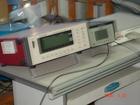*** The impact of appreciation on the instrument industry's import and export
 Since October of this year, as the pressure on the RMB exchange rate in the US and Europe has continued to escalate, the exchange rate of the RMB has hit new highs, and the latest US dollar has exceeded the 6.7 mark on the RMB exchange rate. This has aroused widespread concern from all sectors of society at home and abroad, and the issue of RMB appreciation is bound to rise. The instrument industry, especially China's import and export companies, has far-reaching implications.
Since October of this year, as the pressure on the RMB exchange rate in the US and Europe has continued to escalate, the exchange rate of the RMB has hit new highs, and the latest US dollar has exceeded the 6.7 mark on the RMB exchange rate. This has aroused widespread concern from all sectors of society at home and abroad, and the issue of RMB appreciation is bound to rise. The instrument industry, especially China's import and export companies, has far-reaching implications. According to authoritative statistics, from January to December 2009, China's total instrumentation exports were US$38.914 billion, up 10.2% year-on-year; cumulative imports were US$669.96 billion, up 13.8% year-on-year; and the trade deficit was US$28.082 billion. As we all know, more than 70% of domestic high-end instrument products mainly rely on imports. The appreciation of the renminbi has led to an increase in relative purchasing power, which has reduced the cost of raw material purchases and contributed to the increase in profits for production companies that rely mainly on imported raw materials. Domestic equipment companies can make full use of the opportunity for RMB appreciation and take active measures to invest in the independent research and development of products through the introduction of foreign high-quality component products.
In the long run, the appreciation of the renminbi will affect the export of China's instrumentation industry, and export companies will be negatively affected by the exchange rate appreciation. The appreciation of the renminbi is long-term positive for industries with high proportions of imported businesses and large scale foreign currency debt, but it will have a greater impact on those companies with export-oriented businesses and high foreign currency assets, especially for domestically-made general-purpose analytical instruments and experimental instruments. The weaker companies have a greater negative impact.
The appreciation of the renminbi means that with the same export sales prices, the renminbi for export collections has decreased, while the purchase cost and sales, management, and finance have almost no change. As a result, the profit margin has been compressed or even lost. This means that for those companies that are winning products with lower prices and lower technological content, export profits have been meagrely thin, and the losses caused by changes in exchange rates have been digested. This has made enterprises feel that the future is harder and even affects the survival and development of enterprises. .
On the issue of how to avoid the loss caused by the appreciation of the renminbi, you may wish to refer to three points: First, avoid direct dollar-denomin exchange for renminbi; second, select export agents to transfer risks to foreign trade companies; third, increase product added value and implement multiple The market structure of the products will be transferred from Russia to some economically developed countries and regions such as South Korea, Saudi Arabia, and Dubai, because these countries and regions have stronger spending power and stronger price tolerance.
To deal with exchange rate risk, the fundamental is to rely on the company's own breakthrough, that is, out of a road to transformation and upgrading, and constantly increase the technological content of products, strengthen the construction of independent brands, and increase the added value and core competitiveness of products. Only in this way can we gain competitive advantage in the international market.
Machinery Clamps,Metal Clamps,Metal Strap Clamp,Small Metal Clamps
Ningbo Metal Sharing Supply Chain Management Co., Ltd , https://www.sharescm.com